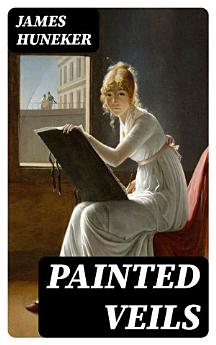Painted Veils
James Huneker
May 2022 · DigiCat
Ebook
260
Pages
family_home
Eligible
info
reportRatings and reviews aren’t verified Learn More
About this ebook
James Huneker's 'Painted Veils' delves into the intricate interplay of sexuality, love, mortality, and the artistic temperament, offering an incisive glimpse into the lives of bohemian New Yorkers. Its prose, rife with voluptuousness and astute observations, provides a narrative that both exalts and questions the excesses and ephemeral pleasures of life. Set within the literary context of the early 20th century, a period of great change and exploration in arts and mores, 'Painted Veils' stands out for the honesty and boldness with which it addressed topics that were deemed taboo at the time, making it a provocative and avant-garde read that startled its contemporary audiences. James Huneker, an esteemed music and art critic of his era, channeled his vast experiences and interactions with the cultural elite into this novel. His keen insight into the psyche of the artist and their circle in New York City at the dawn of modernism lends a credible and engaging backdrop to this fiction. The author's expertise and fascination with the bohemian lifestyle have imbued his work with a richness and a palpable sense of realism that is both captivating and enlightening. 'Painted Veils' is recommended for readers who appreciate a historically grounded exploration of societal norms and the intricacies of human desires. Huneker's narrative invites contemplation and provides a lens through which the present-day reader can examine the cultural controversies and artistic innovations of the past. As a snapshot of an era now distant, this book will especially resonate with those interested in the evolution of social mores, the intellectual ferment of New York life in the early twentieth century, and the timeless complexities of human nature.
About the author
James Huneker (1857-1921) was an esteemed American art and music critic, essayist, and writer of the late 19th and early 20th centuries. His literary contributions include a rich corpus of work that reflects his wide-ranging interests from music, art, and philosophy to the burgeoning cultural changes of his era. A potent figure in the intellectual circles of his time, Huneker's prose is noted for its vivacity and erudition, often infused with a cosmopolitan flair. His book 'Painted Veils' published in 1920, is emblematic of his introspective and often sensual narrative style, which explores the complexities of the human psyche and sexuality. It showcased Huneker's predilection for probing the underlying forces governing social mores and the human condition. Huneker's literary style is marked by a penetrating analysis of European and American cultural life, with an emphasis on the role of the artist in society. His other notable works include 'Egoists: A Book of Supermen' (1909), which profiles figures such as Nietzsche and Ibsen, and 'Iconoclasts: A Book of Dramatists' (1905), where he critically examines the works of playwrights including Ibsen, Strindberg, and Shaw. Huneker's enduring influence is reflected in his ability to bridge the gap between high art and accessible criticism, making him a crucial interpreter of modernist sensibilities to a wider American audience.
Rate this ebook
Tell us what you think.
Reading information
Smartphones and tablets
Install the Google Play Books app for Android and iPad/iPhone. It syncs automatically with your account and allows you to read online or offline wherever you are.
Laptops and computers
You can listen to audiobooks purchased on Google Play using your computer's web browser.
eReaders and other devices
To read on e-ink devices like Kobo eReaders, you'll need to download a file and transfer it to your device. Follow the detailed Help Center instructions to transfer the files to supported eReaders.








